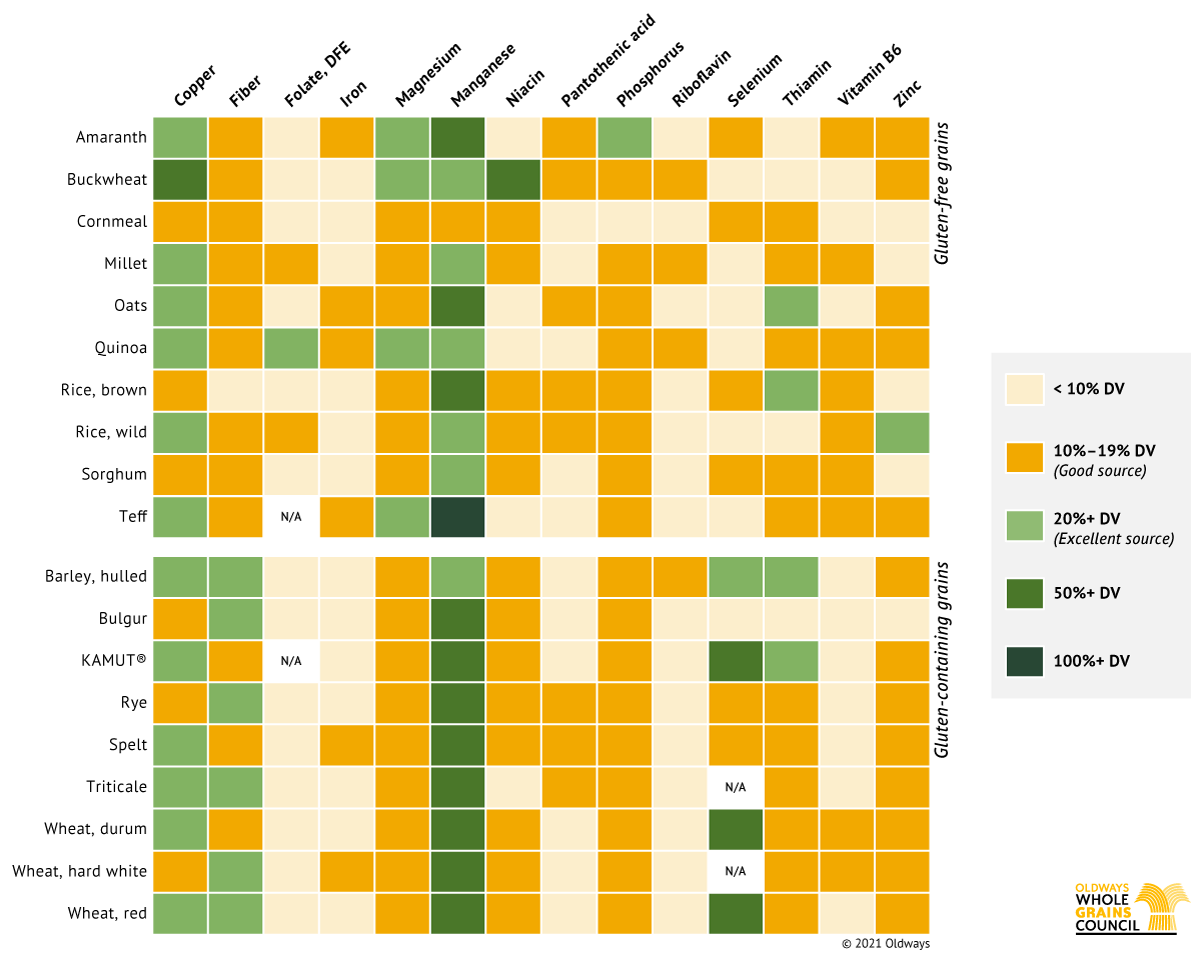Here at the Whole Grains Council, we like to focus on the enjoyment of whole foods, and the place of those whole, real foods in a total balanced diet. We think that counting numbers of calories, fiber, and nutrients detracts from the pleasures of the table. That said, we’re often asked, “Which grains are the healthiest ones?” or “What nutrients make whole grains so healthy?”
There is no “healthiest” whole grain. Some are stronger in one nutrient, and others in different nutrients. It’s like asking what’s the best fruit, or the best vegetable: they all offer different benefits, so wise eaters enjoy a variety, for the best range of healthy nutrients and good tastes.
The chart below lists some of the nutrients that whole grains contribute to a healthy diet, and the proportion of the Daily Value for each. (All amounts based on FDA RACC (standard serving size) of 45g dry grain, a bit less than one cup cooked.)
The US Food and Drug Administration (FDA) considers a food to be a “good source” of a nutrient if a standard-size serving provides 10% of the recommended daily value; an “excellent source” provides 20% or more of the recommended daily value. We’ve noted when some nutrients in whole grains go even farther above these levels!
Note that a blank, white block does not mean that a particular grain contains none of that nutrient. Very often levels fall just short of reaching the “good source” level – but these foods can still make important contributions to your nutrient needs, in combination with other healthy foods.
Get all the nutrients, in spreadsheet form
Click here to download a more extensive chart that includes more nutrients, has amounts for each nutrient, and is in spreadsheet form to make comparisons of various grains simpler.
Explanation of Why your body needs these nutrients
Protein
Surprised to learn that many whole grains are a good source of protein? The proteins in grains mesh with those in beans and other plants to form complete proteins. Your body can’t store protein, so you need to eat some every day.
Fiber
Dietary fiber helps you feel full faster and longer; it also aids digestion and helps prevent constipation. Fiber comes only from plant foods (fruits, vegetables, beans, whole grains), and grain fiber is thought to protect against digestive cancers more than other forms of fiber.
Iron
Iron helps our bodies make hemoglobin (for red blood cells) and myoglobin (for muscles), both of which help carry and store oxygen. Iron also plays a role in many other routine bodily functions.
Magnesium
An essential mineral required for hundreds of biochemical reactions, including transmission of nerve impulses, converting food into energy, body temperature regulation and maintaining a strong immune system. Magnesium also helps us absorb calcium, for healthy bones and teeth.
Phosphorus
Another essential mineral, phosphorus is present in every cell in your body, making up 1% of your body weight. It’s main function is the formation of bones and teeth, but it’s also key to the synthesis of protein for cell repair, growth, and maintenance; for heartbeat regularity; and nerve conduction.
Zinc
The mineral zinc helps your immune system fight off bacteria and viruses, and helps wounds heal. It also helps your body make proteins and DNA. Zinc is also essential to proper functioning of your sense of taste and smell.
Copper
Copper (another mineral) helps us absorb iron, and also helps regulate blood pressure and heart rate. Copper is also needed for the production of melanin, which colors our hair and skin.
Manganese
The mineral manganese helps us handle oxidative stress. It activates many important enzymes in the body that are crucial to metabolism of carbohydrates, amino acids, and cholesterol. Manganese is also essential to the formation of healthy cartilage and bone.
Selenium
Selenium is a trace mineral. Although we only need small amounts of it, it’s essential to helping prevent cellular damage from free radicals, to regulate thyroid function, and for a healthy immune system.
B Vitamins
The many B vitamins help with metabolism, the process your body uses to make energy from the food you eat. While each has its own functions, in general they also help maintain healthy skin, hair and muscles; form red blood cells; and promote healthy immune and nervous system function. Some research shows that B vitamins also prevent mood swings.
Source: USDA FoodData Central, sr28. All amounts based on FDA RACC (standard serving size) of 45g dry grain.

